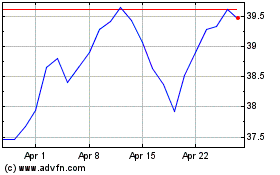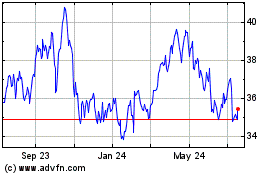Glencore and Qatar together buy 19.5% of Rosneft in a deal
valued at $11.3 billion
By James Marson and Scott Patterson
MOSCOW -- Russia said it sold a 19.5% stake in state-controlled
oil giant PAO Rosneft to a consortium formed by Glencore PLC and
Qatar in a deal valued at some EUR10.5 billion ($11.3 billion), a
move by Russia that would bring in much-needed cash by selling a
portion of one of its crown jewels.
Russian President Vladimir Putin and Rosneft Chief Executive
Igor Sechin discussed the deal in a meeting late Wednesday,
according to a transcript on the Kremlin's website. The Russian
state will retain a controlling stake in Rosneft, which is also
partly owned by U.K. oil major BP PLC.
But there appeared to be some differences between the Kremlin
account of the deal's terms and Glencore's description of the
deal.
The Switzerland-based mining company said it was in "final-state
negotiations" about the deal, and said it was committing EUR300
million. It also received a five-year right to purchase an
additional 220,000 barrels of oil a day from Rosneft for its
trading business.
The balance of the purchase price would be provided by Qatar and
bank lending, Glencore said. Glencore said the deal's structure
meant its risk is limited to its EUR300 million investment,
equivalent to about 0.54% of Rosneft.
Mr. Sechin said Glencore and the Qatar Investment Authority
sovereign-wealth fund would each take half of the 19.5% stake.
Qatar's fund couldn't be reached for comment Wednesday
night.
Russia has long suggested it could sell a stake in Rosneft, the
world's largest-listed oil producer, but held off until weak oil
prices and a two-year recession starved the federal budget,
apparently forcing the Kremlin's hand.
Even though Russia has pumped and exported more oil this year,
its revenue from those sales has plunged because of low crude
prices. From January through August, Russian oil export revenues
dropped 27% to $46 billion, according to the country's Federal
Customs Service.
Selling a Rosneft stake would be a boon for Mr. Putin, whose
country is under sanctions from the U.S. and the European Union
over its military interventions in Ukraine.
Russia has largely looked to China for financing, and Chinese
and Indian state-owned energy companies were seen by analysts as
likely buyers for the Rosneft stake. Rosneft is among the companies
under U.S. sanctions that restrict its ability to raise debt in
U.S. dollars.
The deal could ease concerns about budget funding through the
next Russian presidential elections in spring 2018, said Chris
Weafer, senior partner at Macro Advisory Ltd., a Moscow-based
consultancy.
"It's diversification in political relationships and
investment," Mr. Weafer said. "It shows that there is more than one
buyer in town and that Russia doesn't have to just sell cheaply to
China or India."
The sale of a stake could also help Rosneft expand its access to
global oil markets through a relationship with a major oil trader,
said Michael Moynihan, research director, Russia for energy
consulting firm Wood Mackenzie.
In a meeting in the Kremlin late Wednesday, Mr. Putin
congratulated Mr. Sechin on the deal, saying the sale came at a
favorable time, as the oil price rose after the Organization of the
Petroleum Exporting Countries agreed on production cuts last
week.
Russia has also agreed to trim its crude output by 300,000
barrels a day and is expected to complete that agreement this
weekend, in a deal that could mean Rosneft has to trim back output
along with its new shareholder, Qatar, an influential OPEC member
which is allied closely with top global crude exporter Saudi
Arabia.
Rosneft has moved recently to consolidate the Russian state's
control of the oil sector, acquiring a controlling stake in midsize
Russian oil producer PAO Bashneft in October for the equivalent of
around $5 billion. Rosneft bought rival TNK-BP in 2013 in a $55
billion deal.
Some government ministers have long pressed for the sale of a
stake in Rosneft. But Mr. Sechin has fought to preserve and
increase state control over the oil sector, which provides critical
revenues to the federal budget.
Glencore Chief Executive Ivan Glasenberg has been focused on
selling assets and paring back debt since the firm's stock plunged
last year amid a collapse in commodity prices. The company
suspended its dividend and sold assets ranging from Peruvian gold
to stakes in its Canadian agricultural business.
Last week, Glencore marked a turning point when it said it
planned to reinstate its dividend next year. The move was in part
vindication for Mr. Glasenberg, a highflying CEO whose aggressive
investment strategy and reliance on sky-high debt fell under a
shadow as commodity prices plunged in 2015 amid slowing demand from
China and elsewhere.
--Lynn Cook contributed to this article.
Write to James Marson at james.marson@wsj.com and Scott
Patterson at scott.patterson@wsj.com
(END) Dow Jones Newswires
December 08, 2016 02:47 ET (07:47 GMT)
Copyright (c) 2016 Dow Jones & Company, Inc.
BP (NYSE:BP)
Historical Stock Chart
From Mar 2024 to Apr 2024

BP (NYSE:BP)
Historical Stock Chart
From Apr 2023 to Apr 2024
